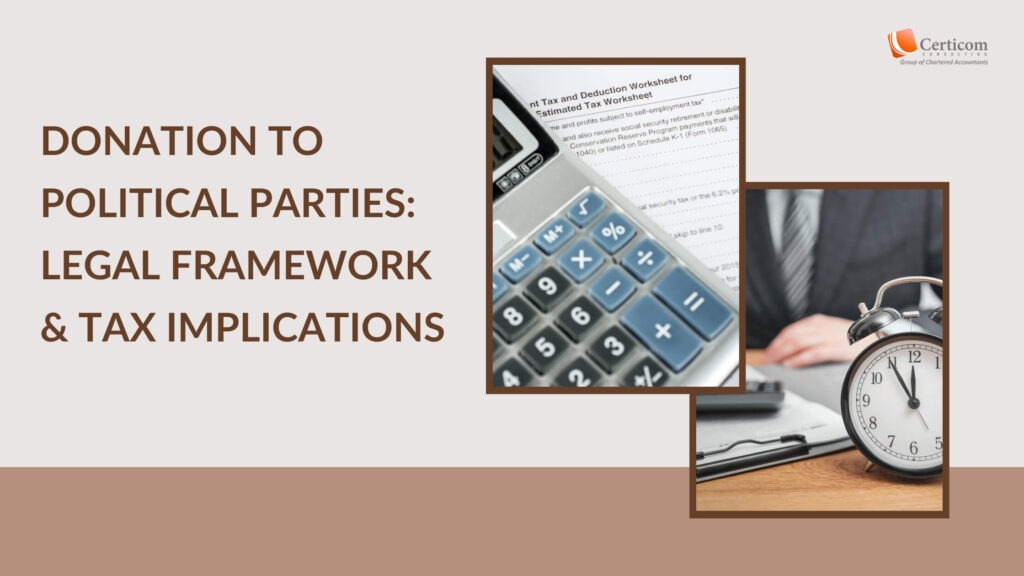Political Donations in India: Legal Framework and Tax Implications

Donating to political parties in India is a common practice, particularly among salaried individuals. The Income Tax Act of India provides specific provisions for claiming tax deductions on such donations under Sections 80GGB and 80GGC. However, the rise of fraudulent practices involving donations to Registered Unrecognised Political Parties (RUPPs) has prompted increased scrutiny by tax authorities. In this blog, we will explore the legal framework surrounding political donations and the issues associated with claiming deductions.
Tax Deductions for Political Donations
Section 80GGB:
- Applicability: This section is specific to Indian companies.
- Deduction: Companies can deduct the full amount of donations made to political parties registered under Section 29A of the Representation of the People Act, 1951, from their taxable income.
- Conditions: The donation must be non-cash and supported by proper documentation.
Section 80GGC:
- Applicability: This section applies to individuals, Hindu Undivided Families (HUFs), firms, and other entities, excluding government-funded bodies.
- Deduction: The full amount of donations made to registered political parties is deductible.
- Conditions: Similar to Section 80GGB, the donation must be made through non-cash means and be properly documented.
The Income Tax Act offers two key sections that allow taxpayers to claim deductions on donations made to political parties:

Challenges with Registered Unrecognised Political Parties (RUPPs)
RUPPs are political parties registered under Section 29A but have not secured enough votes to be recognized as state or national parties. Due to their lesser-known status, some taxpayers have exploited these parties by making bogus donations to claim undue tax deductions.
- Investigations: The Income Tax Department has conducted several searches on RUPPs, uncovering fraudulent donation schemes where fake receipts were issued to taxpayers.
- Legal Actions: If a donation is found to be bogus, tax authorities can disallow the deduction and impose penalties under Sections 68, 69, and 148 of the Income Tax Act for unexplained credits or investments.
Legal Framework and Judicial Rulings
The legal framework surrounding political donations is strict, and the courts have emphasized the importance of transparency and proper documentation.
Section 68 of the Income Tax Act:
- Unexplained Cash Credits: If a taxpayer cannot satisfactorily explain the source of a donation, the amount may be added to the taxpayer’s income as unexplained cash credits, leading to penalties.
Section 69 of the Income Tax Act:
- Unexplained Investments: If a donation appears as an unexplained investment, the amount can be added to the taxpayer’s income, with penalties similar to Section 68.
Section 148 of the Income Tax Act:
- Reopening of Assessments: This section allows the Assessing Officer (AO) to reopen previously completed assessments if there is reason to believe that income has escaped assessment. This can be applied if a taxpayer is suspected of claiming deductions for bogus donations.
Section 151 of the Income Tax Act:
- Sanction for Reassessment: Before issuing a notice under Section 148, prior approval from higher authorities is required to ensure that the reassessment is not done arbitrarily.

Options for Taxpayers Facing Reassessment
Taxpayers who receive reassessment notices related to political donations have several options:
Surrendering the Deduction: The taxpayer can choose to surrender the deduction, accept the tax liability, and pay additional tax along with interest. A penalty for underreporting income may also apply.
Filing an Appeal: If the taxpayer believes the reassessment is unjustified, they can file an appeal before the Commissioner of Income Tax (Appeals) within 30 days of receiving the reassessment order.
Amnesty Schemes: Taxpayers can opt for schemes like the Vivad se Vishwas Scheme (VSVS) to resolve disputes with minimal financial impact.
Understanding the legal framework and tax implications of political donations is crucial for compliance and minimizing risks. Proper documentation and transparency are essential for ensuring that deductions are valid and can withstand scrutiny from tax authorities. Taxpayers must carefully evaluate reassessment notices and consider their options to manage potential liabilities effectively.
Related Post
Foreign Tax Credit in India: A Guide for NRIs
Top 10 Tax Filing Rules for FY 2024-25
Book A One To One Consultation Now For FREE
How can we help? *




